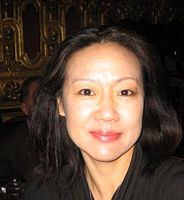Jin Y. Park
Park, Jin
| PersonType | Category:Authors of English Works Category:Professors Category:Editors Category:Translators |
|---|---|
| MainNamePhon | Jin Y. Park |
| bio | Jin Y. Park is Professor of Philosophy and Religion and Founding Director of Asian Studies Program at American University. Park's research areas include East Asian Buddhism (especially Zen and Huayan Buddhism), postmodernism, deconstruction, Buddhist ethics, Buddhist philosophy of religion, Buddhist-postmodern comparative philosophy, and modern East Asian philosophy. Park’s research in Buddhism focuses on the Zen and Huayan schools of East Asian Buddhism on language, violence, and ethics. In her comparative study, Park reads Zen and Huayan Buddhism together with postmodern thought in Continental philosophy, with a special focus on Jacques Derrida’s deconstruction. Park’s research on modern East Asian philosophy examines the dawn of philosophy in East Asia and the East-West encounter in this context. In her monograph Buddhism and Postmodernity: Zen, Huayan, and the Possibility of Buddhist-Postmodern Ethics (2008), Park discusses Buddhism and continental philosophy on the topics of, among others, self, language, and violence. In this book, Park offers the "ethics of tension" as a potential ethical paradigm drawn from Buddhism and postmodern philosophy. Reflections of a Zen Buddhist Nun (2014), is a translation of a book published in Korean in 1960 by Kim Iryŏp (1896-1971), a writer, first-generation Korean feminist, Buddhist nun, and philosopher. In this book, Kim Iryŏp offers a creative interpretation of Buddhist philosophy and practice. In Women and Buddhist Philosophy: Engaging Zen Master Kim Iryop (2017), Park proposes a new mode of philosophizing based on the discussion of Kim Iryŏp’s life and philosophy. Park is also the editor of volumes: Buddhisms and Deconstructions (2006), Merleau-Ponty and Buddhism (co-edited, 2009), Comparative Political Theory and Cross-Cultural Philosophy (2009), and Makers of Modern Korean Buddhism (2010). (Source Accessed May 18, 2020) |
| associatedwebsite | Academia.edu; American University |
| languagetranslation | Korean |
| languagetarget | English |
| affiliation | American University |
| phduniversity | SUNY Stony Brook |
| education | PhD, SUNY Stony Brook;
MA, New York University;
MA, Yonsei University;
BA, Yonsei University (Seoul, Korea) |
| publications | ==Books==
Recent publications (Book chapters and Journal articles)2019 1. “Living without a Canopy: Flanagan, Derrida, and Zen Buddhism on the Production of Meaning” In Naturalism and Asian Philosophy: Owen Flanagan and Beyond, edited by Bongrae Seok. Routledge 2019, 92-110. 2. “Temporality and Non-temporality in Li Tongxuan’s Huayan Buddhism.” In Dao Companion to Chinese Buddhist Philosophy: Dharma and Dao, edited by Sandra A. Wawrytko and Youru Wang. Springer, 2019, 325-347. 3. “Kyŏnghŏ Songu and the Existential Dimensions of Modern Korean Buddhism.” Journal of Korean Religions 10, no. 2 (Oct 2019): 247-274. 4. “Law of Genre and Intercultural Philosophy: A Reading of Kwok-ying Lau’s Phenomenology and Intercultural Understanding.” Dao: A Journal of Comparative Philosophy 18, no. 1 (January 2019): 119-126.
1.“Toccata and Fugue of a Stranger.” Étrangeté, vol. 2 (2018):109-125. 2. “Religion beyond the Limits of Reason: Inoue Enryō, Kim Iryŏp, and Tanabe Hajime on Philosophy of Religion.” In Reconfiguring Philosophy of Religion, edited by Jim Kanaris. Albany: State University of New York Press, 2018, 131-150. 2017 1. “Philosophizing and Power: East-West Encounter in the Formation of Modern East Asian Buddhist Philosophy.” Philosophy East and West 67, no. 3 (July 2017): 801-823. 2. “Zen Buddhism and the Space of Ethics.” In A Mirror is For Reflection: Understanding Buddhist Ethics, edited by Jake Davis. New York: Oxford University Press, 2017, 73-91. 3. “Derida wa Pulgyo, yŏsŏng kŭrigo p’ongnyŏk e kwanhayŏ” (On Derrida, Buddhism, Women, and Violence). Pulgyo p’yŏngnon (The Buddhist Review) 70 (Summer 2017): 31-50. 4. “Pŏphwagyŏng saropkye ilgi, kŭrigo chonggyojŏk segyegwan e tahayŏ” (A new reading of the Lotus Sūtra, and about a religious worldview), Modern Buddhism (December 2016-January 2017). |
| IsInGyatsa | No |
| Other wikis |
If the page does not yet exist on the remote wiki, you can paste the tag |
Full Name
Jin Y. Park

